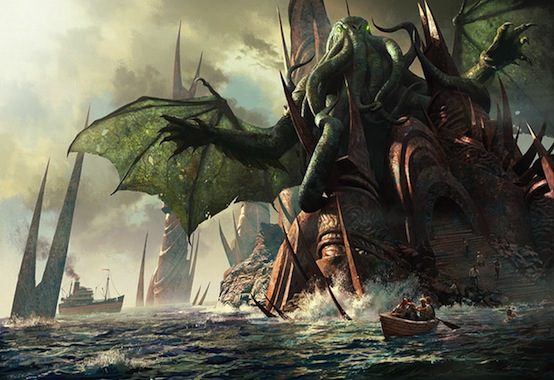10 Sci Fi and Fantasy Works Every Conservative Should Read

The left-wing science fiction writer China Miéville has compiled a list of “50 Sci Fi and Fantasy Works Every Socialist Should Read.” As a longtime reader of speculative and “weird” fiction and qualified admirer of Miéville’s work, I thought it would be fun to offer a companion list for conservatives.
I’m not suggesting that these books express conservative views as such. But they do raise questions for conservatives or develop ideas from which conservatives can learn.
Partly for reasons of time and partly because I wanted to avoided overlap, my list is considerably shorter than Miéville’s: just ten works. I’ve also avoided the most obvious choices, such as Lord of the Rings. As a result, the list is far from exhaustive. I encourage readers to add their own suggestions.
David Brin, The Postman
Very different from the awful movie starring Kevin Costner. Essentially a meditation on the meaning of survival after the collapse of state order. One vision is represented by neo-pagan “Holnists,” for whom survival means the violent triumph of the individual. Another other is embodied by the drifter Gordon, who puts on a discarded postman’s uniform to keep warm but ends up re-founding civil society by carrying mail between isolated settlements.
Philip K. Dick, Do Androids Dream of Electric Sheep?
Also very different from the movie (which is in this case excellent). As the title suggests, the themes are the nature of humanity and meaning of stewardship. Human beings in this postapocalyptic scenario have no outlet for empathy except care for animals, so much so that they buy robotic substitutes when they can’t afford the real thing. On the other hand, androids yearn to be human—the only feeling of which they are capable.
William Gibson and Bruce Sterling, The Difference Engine
A revision of Disraeli’s “State of England” novels for the information age. Due to the success of Charles Babbage’s analytical engine or mechanical computer in 1824, traditional social relations are replaced by a Victorian technocracy. This order is more meritocratic than the old regime and prizes economic freedom. On the other hand, it exercises considerably tighter spiritual control than the squirearchy ever could.
Robert Heinlein, Starship Troopers
Classical republicanism meets interstellar warfare. Starship Troopers presents a society in which citizenship is earned by military service as the only stable alternative to mass democracy. Criticized for fascist tendencies, the vision of Starship Troopers is closer to Plato’s Republic than to any vitalist conception of society. Heinlein himself moved toward libertarianism in the 1960s.
Joe Haldeman, The Forever War
Out of alphabetical order, but an essential companion to Starship Troopers. While Heinlein’s galactic warriors win honor in battle, Haldeman’s find only confusion and shame. One key difference is that military service in Heinlein’s world is voluntary, while Haldeman’s soldiers are conscripts. Another is that Heinlein’s alien enemy attacks Earth in a replay of Pearl Harbor. The Taurans of Haldeman’s story turn out to be victims of a set-up comparable to the destruction of the Maine or the Gulf of Tonkin incident.
Aldous Huxley, Brave New World
The classic depiction of Nietzsche’s Last Men, who enjoy “happiness” without ever questioning the meaning of their lives. In practice, this means dependence on drugs, sexual promiscuity, and physical exercise, less in the spirit of orgiastic hedonism than in pursuit of moderate or, as we would say today, “safe” amusement. The men and women of Brave New World have been liberated from suffering, responsibility, and even ambition (social position is distributed precisely according to genetic endowment). As a result, they’ve lost most of their humanity.
Robert E. Howard, Conan stories
Out of alphabetical order because Howard’s work represents a very different response to the problem of the last men: assertive nihilism. Brin’s Holnists welcomed the collapse of modern society because it gave them opportunity to provide their mettle as individuals. Howard’s words in “Beyond the Black River” could have served as their motto: “Barbarism is the natural state of mankind. Civilization is unnatural. It is a whim of circumstance. And barbarism must always ultimately triumph.”
H.P. Lovecraft, anything really, but particularly the “Cthulhu cycle”
Howard’s friend and mentor, who believed society had to be defended from the eternal danger of barbarism. To quote Rick Brookhiser: “One way to think of Lovecraft is as a demented anticipation of Russell Kirk. Kirk praised the permanent things. The permanent things in Lovecraft are revolting monsters from outer space or undersea who, it turns out, have been here for eons, and sometimes have interbred with us. Connecting with the past in Kirk guides and inspires us. Connecting with the past in Lovecraft makes us lose our minds.”
Walter M. Miller, Jr., A Canticle for Leibowitz
A vivid exploration of the “disquieting suggestion” with which Alasdair MacIntyre begins After Virtue. What if some calamity destroyed modern civilization, and its knowledge were preserved as incoherent fragments? Here, the Catholic Church reprises its historical role as the conservator of civilization through a new Dark Age. Like The Forever War, A Canticle for Leibowitz is inspired by the author’s own military service. While Haldeman was a Vietnam veteran, Miller participated in the destruction of the Benedictine Abbey at Monte Cassino in World War II.
Neal Stephenson, Snow Crash
Although it is best known for its pioneering depiction of virtual reality, the most interesting feature of Snow Crash is its depiction of anarcho-capitalism. The result is not flourishing families or powerful voluntary associations. Rather, it’s a nightmarish consumerism in which all relationships and services are for sale. At the same time, Stephenson alludes to the resilience that Peter Lawler has called “stuck with virtue“. However much technology transforms our surroundings, it can’t alter the kind of beings we are.
Comments